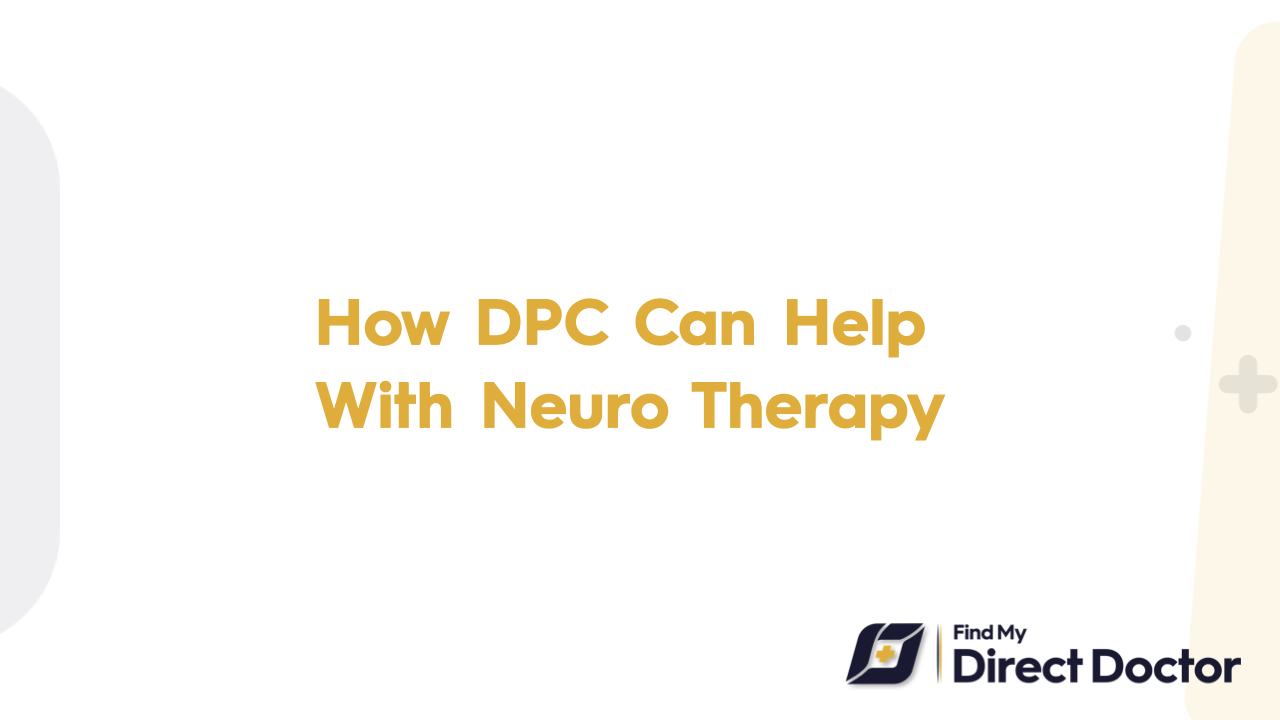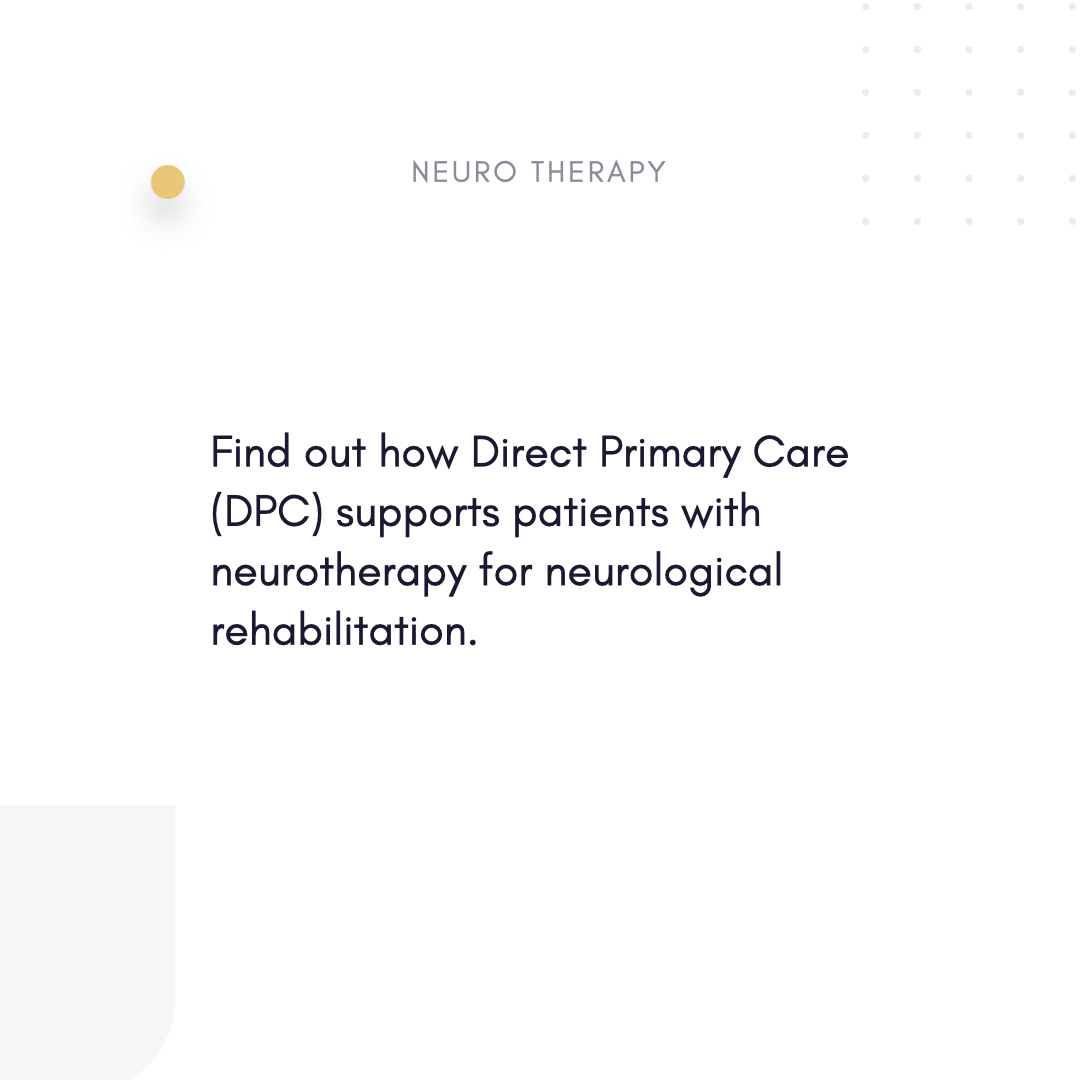



Neuro therapy, also known as neurofeedback or EEG biofeedback, is a non-invasive treatment method that aims to improve brain function and alleviate symptoms of various neurological conditions. As a primary care provider, Direct Primary Care (DPC) assists patients who undergo neurotherapy by providing comprehensive evaluations, guidance, and personalized care.

Individualized Treatment Approach:
Personalized care ensures that treatment protocols are tailored to address specific neurological symptoms and optimize therapeutic outcomes for each patient undergoing neurotherapy.
Comprehensive Evaluation:
Before initiating neuro therapy, DPC providers conduct comprehensive evaluations to assess the patient's neurological health status, medical history, and presenting symptoms. In this way, underlying neurological conditions can be identified and treatment plans can be tailored.
Guidance and Education:
In addition to explaining how neuro therapy works, its potential benefits, and what to expect during therapy sessions, DPC providers provide guidance and education to patients considering the treatment. By doing so, patients can actively participate in their neurological health treatment process and make informed decisions.
Continuity of Care:
With DPC, patients have ongoing access to their healthcare provider throughout the neurotherapy process, which is one of the key benefits. As a result, open communication is promoted, treatment plans can be adjusted in a timely manner, and any emerging concerns can be addressed quickly.
Integration with Conventional Medicine:
DPC providers understand the importance of integrating neuro therapy with conventional medical approaches for comprehensive neurological care. As a result of collaboration with primary care physicians and specialists, DPC providers ensure neuro therapy complements existing treatment modalities and contributes to the overall wellness of patients.

Initial Consultation:
Neurotherapy begins with a consultation with a DPC provider who specializes in neurofeedback. The provider discusses the patient's neurological symptoms, treatment goals, and any relevant medical history during this visit. As a result of this information, a personalized neurotherapy plan can be developed.
Neurological Assessment:
To evaluate the patient's brain function, including attention, memory, and executive function, DPC providers perform a comprehensive neurological assessment. A baseline measurement and treatment target may be established using questionnaires, cognitive tests, and other neurofeedback-specific evaluations.
Treatment Planning:
The DPC provider creates a customized neuro therapy treatment plan for the patient based on the initial consultation and neurological assessment. This plan outlines the frequency and duration of neurofeedback sessions, the specific neurofeedback protocols to be used, as well as any additional interventions or lifestyle modifications to support treatment outcomes.
Neurofeedback Sessions:
Sensors are placed on the scalp during neurofeedback sessions to measure brainwave activity while the patient sits comfortably. Through visual or auditory cues, the patient engages in activities or exercises designed to modulate brainwave patterns. These sessions are overseen by DPC providers, who track the patient's progress and adjust neurofeedback parameters accordingly.
Ongoing Monitoring and Support:
The DPC provider monitors the patient's progress during neurotherapy, tracks the patient's response to treatment, and provides ongoing support and guidance throughout the treatment process. As part of regular follow-up appointments, treatment outcomes are discussed, neurofeedback protocols are refined, and any concerns or issues are dealt with.
Integration with Lifestyle Modifications:
In addition to neurotherapy, DPC providers may recommend lifestyle modifications that enhance its effectiveness. To support overall brain health and neurological function, these strategies may include strategies for optimizing sleep, managing stress, improving nutrition, and integrating physical activity into daily routines.
Long-Term Wellness Maintenance:
The DPC providers work with patients after the neurotherapy program to develop long-term wellness plans designed to ensure ongoing neurological health and maintain the benefits of the treatment. In addition to neurofeedback sessions for maintenance, strategies for preventing relapse and promoting sustained well-being may also be employed.
Previous Post